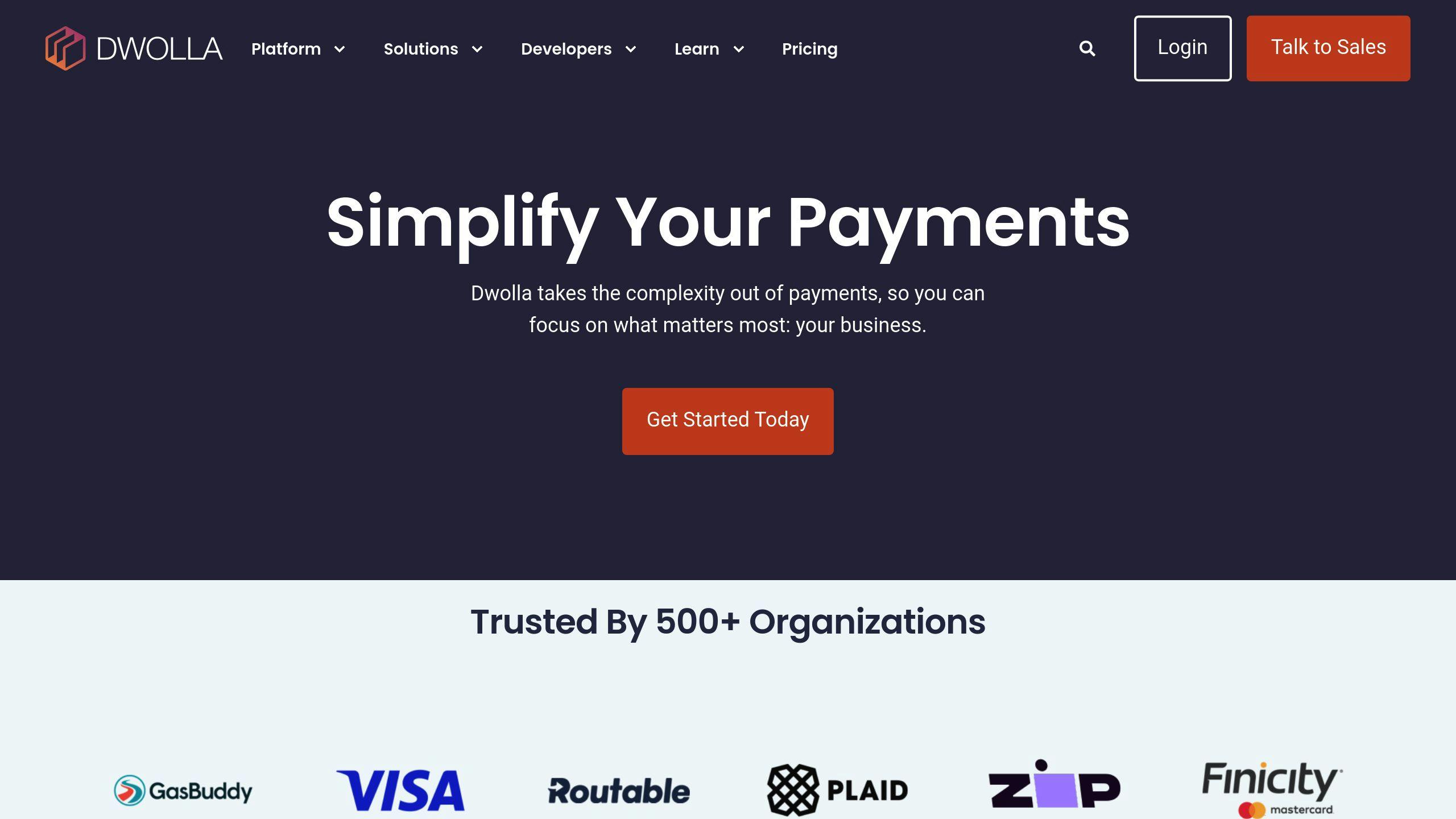Looking to integrate payments into your email campaigns? Here’s a quick guide to help you compare top payment gateways like Stripe, PayPal, Square, and Dwolla. Each offers unique features for secure, efficient transactions.
Key Features to Consider:
- Security: PCI DSS compliance, fraud detection, and encryption.
- Fees: Ranges from 0.5% + 50¢ (Dwolla) to 2.9% + 30¢ (Stripe, PayPal, Square).
- Global Support: Stripe (135+ currencies), PayPal (200+ countries), Square (limited), Dwolla (U.S. ACH only).
- Integration: APIs, plugins for platforms like Shopify, WooCommerce.
- Specialization: Subscription billing (Stripe), ACH transfers (Dwolla), global reach (PayPal), in-person sales (Square).
Quick Comparison Table:
| Gateway | Security | Fees (US) | Global Support | Strengths | Weaknesses |
|---|---|---|---|---|---|
| Stripe | PCI DSS, tokenization | 2.9% + 30¢ | 135+ currencies | Subscriptions, APIs | High intl. fees |
| PayPal | Fraud protection | 2.9% + 30¢ | 200+ countries | Trusted, global reach | Limited recurring billing |
| Square | End-to-end encryption | 2.9% + 30¢ | Limited | In-person + email payments | Not ideal for digital-only businesses |
| Dwolla | ACH-focused security | 0.5% + 50¢ | U.S. only | Affordable ACH payments | Limited payment methods |
Choose the gateway that matches your business needs - whether you prioritize low fees, global reach, or advanced features like subscriptions or ACH transfers. Ready to dive deeper? Let’s explore each option.
Stripe vs Square: Which Payment Gateway is Right for Your Business?

1. Stripe Features and Benefits
Stripe is a popular payment gateway solution that integrates seamlessly with email marketing, offering a range of features to meet diverse business needs.
Security Infrastructure
Stripe ensures top-tier security with PCI DSS compliance. It uses tools like Stripe.js and Stripe Elements, along with advanced algorithms, to monitor transactions and reduce fraud risks. This makes it a reliable option for secure payment processing in email campaigns.
Integration Capabilities
Stripe works smoothly with major e-commerce platforms such as Shopify, WooCommerce, and Magento. Its APIs and plugins make it easy to connect with email marketing tools, ensuring a hassle-free setup.
Payment Processing and Pricing
With a straightforward pricing model - 2.9% + 30¢ per transaction - and support for over 135 currencies, Stripe is ideal for businesses targeting global markets. Note that international transactions come with an extra 1% fee.
Subscription Management
For businesses running subscription-based email campaigns, Stripe simplifies the process. Its tools handle recurring payments, retries, and invoicing automatically, saving time and reducing manual effort.
Support System
Stripe offers 24/7 customer support through email, live chat, and phone, helping businesses quickly address any payment-related concerns.
Although Stripe delivers a robust set of features, alternatives like PayPal also offer distinct advantages worth considering.
2. PayPal Features and Benefits

PayPal is widely recognized for its extensive reach, reliable security, and ease of use. These qualities make it a popular choice for integrating payment options into email campaigns. Here's a closer look at what it offers.
Security Infrastructure
PayPal uses a secure redirect system to protect customer payment data during transactions initiated from email links. Its around-the-clock fraud monitoring adds an extra layer of safety, removing the need for businesses to manage separate SSL certificates.
Integration Options
PayPal works smoothly with platforms like Magento, BigCommerce, Shopify, and WooCommerce. This compatibility simplifies its use in email marketing, while its notification system ensures businesses can easily track transaction updates.
International Reach and Currency Options
With operations in over 200 countries and support for more than 25 currencies, PayPal is a practical choice for businesses targeting international audiences via email. It streamlines cross-border transactions, making global email campaigns more effective.
Payment Processing and Fees
PayPal charges 2.9% + 30¢ per domestic transaction and 4.4% + a fixed fee for international transactions. These straightforward rates make it an accessible option for handling payments through email.
Customer Support
PayPal provides 24/7 assistance through various support channels, ensuring businesses can resolve issues quickly and efficiently.
Drawbacks
One downside is PayPal's limited options for recurring billing, which may not meet the needs of businesses running subscription-based email campaigns [2].
While PayPal excels in global accessibility, Square offers features designed specifically for small businesses. We'll dive into those next.
sbb-itb-6e7333f
3. Square Features and Benefits
Square is a payment gateway designed to handle transactions securely while offering integrations and tools that work well with email marketing campaigns. Here's a closer look at its standout features.
Security Infrastructure
Square prioritizes payment security by using PCI-DSS compliance, end-to-end encryption, tokenization, and two-factor authentication. These measures help safeguard sensitive payment information.
Integration and Features
Square works smoothly with popular e-commerce platforms like Shopify, WooCommerce, and Magento. This ensures a hassle-free payment experience for customers coming from email campaigns. It supports recurring payments, international transactions, and digital wallets like Apple Pay and Google Pay, making it a flexible choice for email-based payment solutions.
Pricing Structure
Square's pricing is straightforward: 2.9% + 30¢ per domestic transaction and an additional 1% for international payments. There are no setup or monthly fees, making it a budget-friendly option for businesses of various sizes.
Customer Support
Square provides 24/7 phone and email support, along with a detailed knowledge base. This ensures businesses can quickly resolve any payment-related concerns.
Business Applications
Square's tools are especially useful for businesses that combine email marketing with in-person sales. Its unified commerce approach allows payments to be processed directly through email campaigns, improving customer convenience and driving higher conversion rates.
While Square is excellent for blending online and offline transactions, the next section will dive into Dwolla's focus on ACH payments for a different kind of payment solution.
4. Dwolla Features and Benefits

Dwolla focuses on ACH Network transactions and API tools designed for email payment integration, offering a practical solution for businesses that rely on direct bank transfers.
Security and Integration
Dwolla prioritizes secure ACH transactions, using enterprise-level security protocols and providing a Sandbox environment for safe testing. Its API is designed to simplify complex payment workflows, making it easier to integrate with email marketing systems.
Pricing Structure
Dwolla's pricing is straightforward: 0.5% + 50¢ per U.S. transaction, with no setup or monthly fees. This structure is especially appealing to businesses that handle high-value transactions through email payments, keeping costs predictable and manageable.
Business Applications
Dwolla is well-suited for batch payments, recurring transactions, and secure bank transfers, making it an excellent choice for businesses with complex payment needs. Its focus on ACH transfers offers a solid alternative to card-based payment systems, catering to those who prefer direct bank transactions.
The platform also includes strong account verification and customer management tools, ensuring reliable and secure payment processing. Dwolla's specialized ACH capabilities make it a standout option in the email payment space.
Next, we’ll explore how Dwolla’s ACH-focused tools stack up against other payment gateways for handling diverse email payment requirements.
Strengths and Weaknesses of Each Gateway
This comparison highlights key factors businesses often consider, such as security, fees, and global compatibility.
| Gateway | Security & Compliance | Transaction Fees (US) | International Support | Key Advantages | Main Drawbacks |
|---|---|---|---|---|---|
| Stripe | PCI DSS compliance, tokenization | 2.9% + 30¢ | 135+ currencies, +1% fee | Strong security, subscription tools | Higher fees for international transactions |
| PayPal | 24/7 fraud protection | 2.9% + 30¢ | 200+ countries, 25+ currencies | Trusted, widely recognized | Expensive for international payments |
| Square | Built-in fraud detection | 2.9% + 30¢ | Limited international support | Excellent for in-person payments | Not ideal for digital-only operations |
| Dwolla | Enterprise-grade security | 0.5% + 50¢ | US-focused ACH transfers | Affordable ACH payments | Fewer payment options |
Each payment gateway has its own strengths tailored to different business models. Stripe stands out for its robust security features, helping to minimize fraud in email-based payments. Its wide range of tools makes it a great option for businesses offering subscription services.
PayPal is a globally trusted solution. Its integration can increase conversion rates by up to 44% [2][3], thanks to its widespread acceptance and familiarity among users.
Square shines in blending online and offline payment processing, making it a top choice for businesses that handle both. However, it’s less suited for operations that are entirely digital.
Dwolla focuses on ACH transfers, offering a competitive fee structure of 0.5% + 50¢ per transaction [1][2]. This makes it particularly effective for businesses handling high-value email payments.
For a deeper dive into email marketing platforms that work well with these gateways, the Email Service Business Directory offers detailed comparisons to guide your decision-making.
Choosing the right gateway depends on your specific business requirements. Understanding these pros and cons is a critical step in finding the best fit.
Final Thoughts
Choosing the right payment gateway is a crucial step in ensuring smooth email-driven transactions. Since these transactions directly influence your business outcomes, it's important to align your payment gateway choice with your email marketing strategy for the best results.
When assessing payment gateways, focus on security, cost, and global compatibility. For businesses just starting out, the Email Service Business Directory is a helpful resource. It offers detailed comparisons of payment gateway integrations with various email marketing platforms, making it easier to match options to your needs.
Keep in mind that your payment gateway requirements may change as your business evolves. For example, Stripe stands out with its advanced developer tools and strong security features, while PayPal's wide recognition can help build customer trust. On the other hand, Square is ideal for businesses with both online and physical operations, though it may not be the best fit for those targeting international markets.
In some cases, a hybrid approach might work best. For instance, using PayPal for international customers and Dwolla for domestic high-value transactions can strike a balance between cost and convenience. After selecting a gateway - or a combination - it’s wise to set up a plan for regular performance reviews to ensure your solution continues to meet your goals.
Frequent evaluations are especially important during key changes, such as shifts in transaction volume, market expansions, or compliance updates. Staying informed about payment processing trends will also help you remain competitive and ensure your gateway remains a good fit for your email marketing needs.
Ultimately, the success of your email payment integration depends on choosing a gateway that not only meets your current needs but also supports your growth. By considering these factors and consistently reviewing performance, you can build a payment system that supports both your business and your customers effectively.


